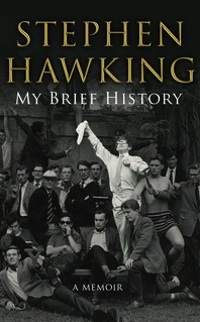Review: My Brief Historyby Jeff Foust
|
| “When you are faced with the possibility of an early death, it makes you realize that life is worth living and that there are lots of things you want to do,” he writes. |
“To my colleagues, I’m just another physicist, but to the wider public, I became possibly the best-known scientist in the world,” Hawking writes near the end of his short autobiography, My Brief History. He credits that fame in part to the fact that scientists typically are not “rock stars,” but also because he believes he fits “the stereotype of the disabled genius.” Overall, he writes, he’s welcomed the fame, for whatever reasons that created it, finding the pluses it’s offered outweighing any negatives, like a lack of privacy.
My Brief History is not just a play on words, but an accurate description: it is a short (less than 150 pages, with pictures) autobiography by Hawking, describing his life from his modest childhood through his academic pursuits and personal challenges. His decision to study cosmology, he writes, was rooted in a childhood interest in model trains and complex board games: “an urge to know how systems worked and how to control him,” something he says his studies of the universe now satisfy. “If you understand how the universe operates, you control it, in a way.”
That fascination with understanding how the universe works, though, did not immediately translate into a career in research. As an undergraduate at Oxford, he didn’t devote much time to his studies, a trait he shared with any classmates, who felt that putting effort into work was beneath them. What changed his mindset was the onset of ALS and the fear that he might live for only a few more years. “Before my condition was diagnosed, I had been very bored with life. There had not seemed to be anything worth doing,” he writes. “When you are faced with the possibility of an early death, it makes you realize that life is worth living and that there are lots of things you want to do.”
| “I have had a full and satisfying life,” Hawking writes. “It has been a glorious time to be alive and doing research in theoretical physics. I’m happy if I have added something to our understanding of the universe.” |
That newfound focus—also provided by becoming a husband and father—led to studies of spacetime and black holes, where he gained his academic reputation. His broader public recognition would come later, primarily with the 1988 publication of A Brief History of Time, a book he says he wrote in part to pay for his daughter’s school fees (although she was in her final year of school when the book was finally published.) He writes that he believes the book became a bestseller not because of the human interest angle about Hawking himself, but because of genuine interest by the public in how the universe works: he says he still receives a “pile of letters” from people who have read the book and asking questions or making comments on it, suggesting to him that people didn’t just buy it to place on their coffee tables.
My Brief History is ostensibly an autobiography of Hawking, but it’s also a science book in some respects, too. He interleaves his research into the discussion of his life and career, including devoting an entire chapter on whether time travel is possible, diving deep into the physics of it at times: “However, the expectation value of the energy momentum tensor depends on the quantum state of the fields on the background.” He does discuss his personal life, from his medical crises to his two marriages and divorces, but doesn’t dwell on them. Late in the book he mentions, in passing, his experience on a zero-g aircraft flight in 2007 and that he’s “booked to go into space” for a suborbital spaceflight with Virgin Galactic, but doesn't go into details on his zero-g experience or his interest in spaceflight.
Hawking appears to be a man who has, in many respects, conquered his disability, in the sense that it has not prevented him from pursuing his academic pursuits, including his childhood desire to know how things, including the universe, worked. (He adds that, in some respects, ALS has actually helped, relieving him of any teaching duties and committee work, allowing him to focus on his research.) “I have had a full and satisfying life,” Hawking, now 71, writes. “It has been a glorious time to be alive and doing research in theoretical physics. I’m happy if I have added something to our understanding of the universe.” Given his scientific accomplishments, and his public fame, the “if” in that preceding sentence is not necessary.
